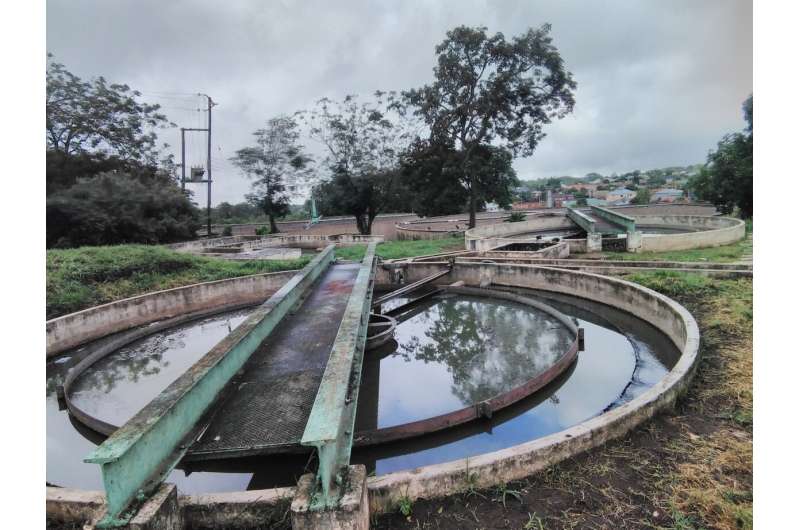Wastewater an untapped resource in COVID-19 fight

Investing in wastewater treatment could improve availability of water resources but countries in Sub-Saharan Africa are not prioritizing it even as the region grapples with water scarcity amid the COVID-19 pandemic, experts say.
Africa is the world's second driest continent after Australia, with only nine percent of global water sources, according to the Sanitation and Wastewater Atlas of Africa, published in 2020 jointly by the United Nations Environment Programme, GRID-Arendal, and the African Development Bank.
"As the world seeks to rebuild after the [COVID-19] pandemic, it is critical that we look at sanitation and hygiene through a lens of both building back better and resilience," Dominic O'Neill, executive director for the Sanitation and Hygiene Fund (SHF), tells SciDev.Net.
O'Neill says that SHF supports efforts on wastewater management and is particularly interested in the scaling up of low-cost sanitation solutions with benefits for both people and nature.
Sanitation and economic growth
According to O'Neill, poor access to sanitation and hygiene, in particular in education and work environments, and lack of investment in the sector undermines economic growth for individuals, families and countries.
"Sanitation and hygiene have too long been considered an unaffordable burden but in reality, it is an investment opportunity that can yield not just financial benefits but also social benefits such as education, jobs, gender empowerment, livelihoods, [among others]," he says.
Water Aid Southern Africa indicates that trillions of dollars could be unlocked over the next two decades through universal access to water, sanitation and hygiene (WASH) services.
The freshwater resources which Africa has are disproportionately distributed across the continent due to variability in rainfall patterns and long dry seasons in most parts.
In what could be an indication of how desperate the situation is getting, between 2013 and 2017, most of the countries in Sub-Saharan Africa suffered a decline in per capita internal renewable water resources, the atlas shows.
The atlas says that the decline has resulted in reliance on groundwater, highlighting the importance of treating wastewater to replenish aquifers and improve quality of both ground and surface water, which would contribute to meeting the pressing need for WASH facilities.
Basic sanitation services lacking
According to the African Development Bank, even basic sanitation and hygiene services are lacking in parts of Sub-Saharan Africa, particularly in rural communities.
In 2017, of the over 750 million people who lacked access to at least basic sanitation services, 513 million of them lived in rural areas.
In the Southern Africa Development Community (SADC) region, data from the World Health Organization shows the different levels of sanitation
coverage between urban and rural populations.
For example, 73% of Namibia's rural population practice open defecation compared with only one% of the rural population in Comoros.
Only six percent of the rural population in Madagascar have access to basic sanitation whereas the figure for Mauritius is 95%.
While only six percent of Botswana's rural population have unimproved sanitation, 58% of the rural population in Malawi have unimproved sanitation.
COVID-19's impact on water security
Osward Mulenga Chanda, director of water and sanitation at the African Development Bank, says that COVID-19 has pushed to prominence the deficiencies in water security in Africa, "particularly given that water, sanitation and hygiene are the first line of defense" against COVID-19.
At the same time, the pandemic has slowed down African economies, affecting investments in water security, he adds.
"Water security investments may be delayed or even canceled due to new priorities in the health and other sectors," says Chanda. "Augmenting resources allocated to water security is necessary to build the resilience of the water sector."
As pressure mounts on water availability amid the need to address WASH issues, wastewater management, which offers potential in meeting water, sanitation and hygiene needs, has not been a priority investment area of most governments in the region.
Less than 20% of the wastewater generated in Africa is treated, according to Chanda.
Chanda says water security investments also affect other sectors such as energy, which he says could yield substantial economic benefits in the face of the economic impacts of COVID-19.
"The AFDB, therefore, joins all sanitation and water partners to call upon finance and sector ministers to make WASH a central part of any post-COVID-19 national recovery plan," he says. "Access to water, hygiene and sanitation provides improved pandemic resilience, health benefits and creates employment opportunities."
Wastewater as a COVID-19 solution?
As Africa grapples with COVID-19, wastewater testing could be an advantage in tackling the pandemic, says Colleen Naughton, a wastewater management expert and an assistant professor at the US-based University of California.
According to Naughton, wastewater monitoring for SARS-CoV-2 (the virus that causes COVID-19) in Africa would help with COVID-19 because it can be used as a potential early warning system before cases increase.
"People shed the virus when they are asymptomatic and early before they become asymptomatic and you can analyze samples in 24 hours," she says. "Wastewater usually is a combination of hundreds to thousands of people so you get a pooled sample."
Naughton believes that wastewater testing would be a good supplement given the lower amount of access to clinical and rapid tests for COVID-19 in Africa.
She says that African countries such as Ghana, Malawi and South Africa are already using wastewater to detect COVID-19.
"However, there is still a severe lack of wastewater monitoring for SARS-CoV-2 in Africa, similar to disparities in access to vaccination and clinical testing," she explains.
Naughton attributes Africa's challenges in wastewater surveillance to lack of resources and prioritization.
She adds, "It is also challenging to monitor wastewater in non-sewered systems that are more prevalent in Africa. There are less laboratories equipped with the technology to monitor and there may be more logistical or transportation challenges with monitoring and getting supplies to test."




















